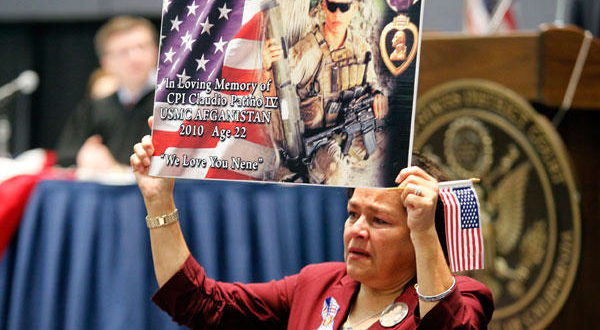'Parole in place': Obama's illegal-immigration order stokes amnesty worries
Published on December 10th, 2013
The Obama administration has issued a directive on illegal immigration that allows undocumented immigrants who are closely related to military personnel to stay in the country. The order comes amid mounting pressure on President Obama.
By Lourdes Medrano, Correspondent
December 9, 2013
Christian Science Monitor
Facing intense pressure from immigrant advocates who want the president to do more to limit deportations, the Obama administration has quietly issued a directive to help undocumented immigrants who are closely related to military personnel stay in the country.
The effort is called "parole in place," and it aims to end rampant confusion among immigration officials about how to treat the parents, spouses, and minor children of those in active duty as well as veterans and reservists. Under parole in place, these relatives no longer have to leave the country to apply for legal US status – a situation that often resulted in the applicants being barred from reentering the US for years.
The move follows a more sweeping decision by President Obama last year to defer deportation for some young immigrants who have lived in the United States illegally since they were children. With immigration reform having ground to a standstill in Congress, such executive-branch actions are seen as the only means for Obama to advance pro-immigrant policies, at least for now.
RECOMMENDED: Could you pass a US citizenship test?
It is unclear how many undocumented immigrants the directive will affect. But "it's very significant," says Margaret Stock, an Alaska immigration attorney and retired Army reserve lieutenant colonel. "It will affect a lot of people."
Late last month, Mr. Obama was heckled at an event in San Francisco by a young man who complained: “Our families are separated. I need your help! You have a power to stop deportation for all undocumented immigrants in this country.”
Obama countered: “Actually, I don't,” and argued that only Congress, through immigration reform, can stop deportations on a massive scale.
But the Department of Homeland Security has long had the authority to halt the deportation of people related to military personnel, and it is this function that the department clarified with specific guidelines to US Citizenship and Immigration Services (USCIS) in a Nov. 15 memorandum. The order relies on existing statutes and is not an eclipsing of congressional authority, homeland security officials say.
Critics disagree. They see parole in place, like Obama's Deferred Action for Childhood Arrivals last year, as amnesty by small drips.
"By the end of 2016, the administration may well have decided it can parole in nearly all of the illegal alien population," writes Dan Stein of the Federation of American Immigration Reform, which pushes for tight immigration laws, on the group's website. "Finding ways to overcome statutory limits on immigration appears to be the administration’s overriding policy objective."
For some military families, parole in place will ease the anxiety deployed service men and women felt about the possibility of family members being deported in their absence, officials say. The idea of having to leave the country in order to legally gain reentry has been "an infamous Catch-22 that's been in the law since 1996 when Congress created it," says Ms. Stock.
The US government has historically relied on immigrants to help fight its wars. Almost half of enlisted Army soldiers in the 1840s were immigrants, and, between 1862 and 2000, more than 660,000 veterans obtained citizenship, says Lt. Cmdr. Nate Christensen, a Department of Defense spokesman.
"Noncitizens that serve in the armed forces have, and will continue to play a vital role in the US military," he adds, noting that some 35,000 noncitizens serve in the military, with about 5,000 of them enlisting each year.
After 9/11, the government made various policy changes to encourage legal residents to enlist in the military, says Daniel Cosgrove, a USCIS spokesman.
President Bush's 2002 order offering noncitizens a fast track to citizenship proved attractive for many immigrants who chose to join the armed forces. Between that year and 2013, a total of 97,742 immigrants became naturalized US citizens here and abroad.
Up until the draft ended in 1973, many immigrants who served in military combat were in the country illegally.
"Undocumented people get drafted," Stock says. "And so if you were a male, and you were living in the country without papers, you got drafted, and you would serve in the military and get your citizenship after you got drafted."





